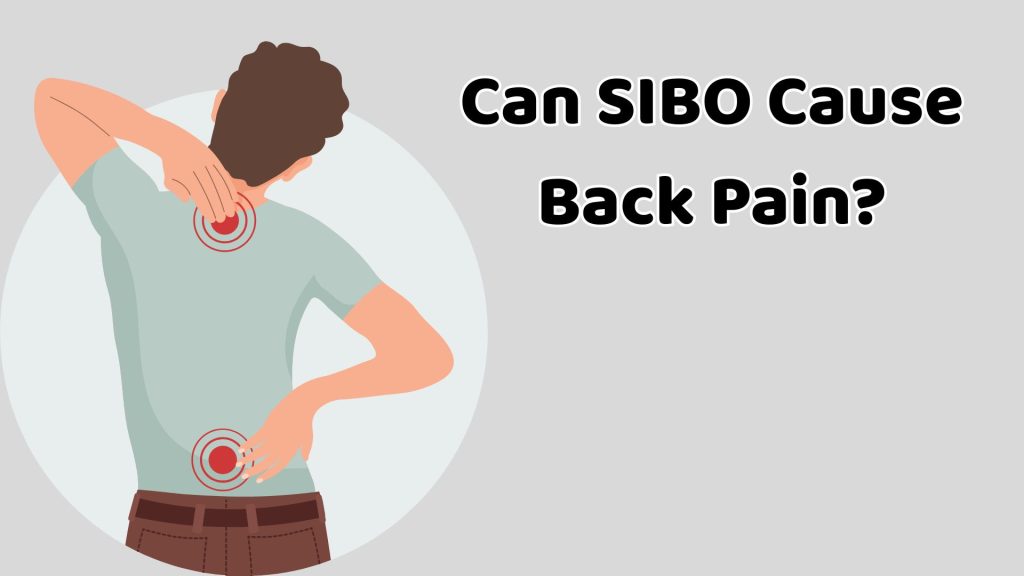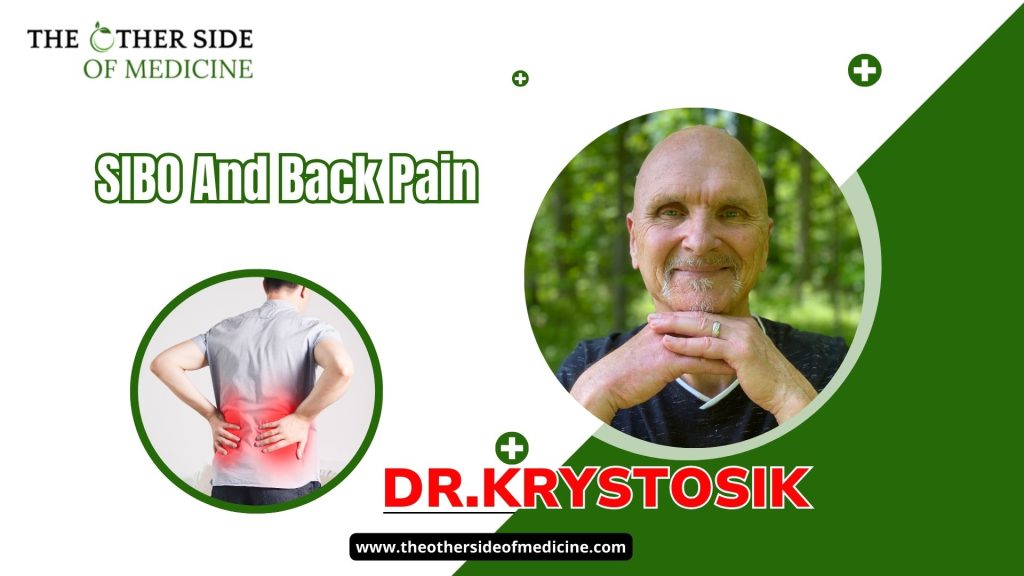Back pain—it’s one of the most common complaints in doctor’s offices across the country. As a chiropractic physician I find many of my patients automatically assume their aching spine is the result of a herniated disc, a pulled muscle, or just “getting older.” However, there’s another, often-overlooked culprit that may be hiding in plain sight: SIBO—Small Intestinal Bacterial Overgrowth.
If you’ve never heard of SIBO, don’t worry—you’re not alone. And if you’re wondering what in the world your gut bacteria have to do with your aching back, keep reading. The answer might surprise you, and it could completely change your approach to chronic pain.

How SIBO Can Trigger or Worsen Back Pain?
Let’s explore three key mechanisms that link SIBO to back pain:
1. Referred Pain from Internal Organs
Your digestive organs are powered by the same spinal nerves that serve your back muscles. When inflammation builds up in the small intestine due to bacterial overgrowth, your nervous system may interpret this as pain coming from your back.
In this circumstance, your spine is not the problem—it’s your gut that is crying out for help, and your brain is misinterpreting the signal.
Think about a heart attack that can radiate pain into the arm or jaw? The same concept applies to the SIBO referred pain. The gut can send pain signals that radiate into the mid or lower back.
2. Chronic Inflammation and Systemic Pain
When SIBO is present, your body mounts a low-grade, chronic inflammatory response. The body is flooded with inflammatory compounds called cytokines. These bad boys don’t just stay confined to the gut.
They travel through your bloodstream, aggravating nerves and increasing the perception of pain in muscles and joints. It’s like your entire body is on high alert, and even mild back tension can become excruciating.
This systemic inflammation can also aggravate pre-existing back issues like arthritis or disc degeneration, turning a mild problem into a major one.
3. Poor Posture and Muscular Imbalance
Let’s be honest: when your belly is bloated, gassy, and cramping, your posture suffers. People with SIBO often hunch forward to relieve pressure in their abdomen. Over time, this leads to muscle imbalances, tight hip flexors, and weakened core muscles—all of which contribute to lower back strain.
In my clinical experience, many patients suffering from “unexplained” back pain, particularly women with IBS-type symptoms, experience significant relief once we treat their SIBO and restore proper gut function.
Real-Life Example: Susan’s Story
Susan, a 45-year-old schoolteacher, came to me with chronic lower back pain. She had been to orthopedic specialists, tried chiropractic adjustments, physical therapy, and even pain medications—all with little to no lasting relief.
But when I started asking questions about her gut health, the real culprit appeared: bloating after meals, irregular bowel movements, fatigue, and brain fog. Her symptom survey score lit up like a Christmas tree. SIBO—the unsuspected culprit was the cause of her back pain, too.
Within three weeks of initiating a targeted gut-healing program (which included dietary changes, natural antimicrobials, and a personalized food plan), not only did her digestive symptoms improve, but her back pain also dramatically decreased. Susan didn’t need a new mattress—she needed a new microbiome.
Why Conventional Medicine Misses the Link?
Traditional medical training focuses on specialties—orthopedics for the back, gastroenterology for the gut. But the body doesn’t operate in isolated systems. It’s an integrated whole system. Sadly, most conventional doctors never learn about the connection between digestive dysfunction and musculoskeletal pain.
Functional medicine, the model I’ve embraced for over 35 years, asks not just what is wrong, but why it’s wrong. It searches upstream for the root cause, not just to mask the pain, but to correct the imbalance at its source.
What Can You Do?
If you suffer from chronic back pain and any of the following gut-related symptoms, SIBO could be the hidden link:
- Bloating or gas after meals
- Irregular bowel movements
- Brain fog or fatigue
- Abdominal cramping
- Food sensitivities
Here’s what I recommend:
- Complete a SIBO symptom questionnaire – The simplest and quickest way to identify if you’re a victim of SIBO.
- Start a food journal – Identify any connections between what you eat and how your back feels.
- Avoid carbs from hell – Refined sugars and processed grains feed the bad bugs.
- Seek out a functional medicine provider – Partner with a physician who understands the gut-body connection.
Final Thoughts

The next time you reach for painkillers or consider another spinal injection, ask yourself: Could my back pain be coming from my belly?
Don’t let a bloated belly and bad bugs steal your quality of life. By addressing gut health, you might not only relieve digestive distress but also finally find freedom from back pain that has plagued you for years.
Your back may be crying for help, but the signal may be coming from your small intestine.

